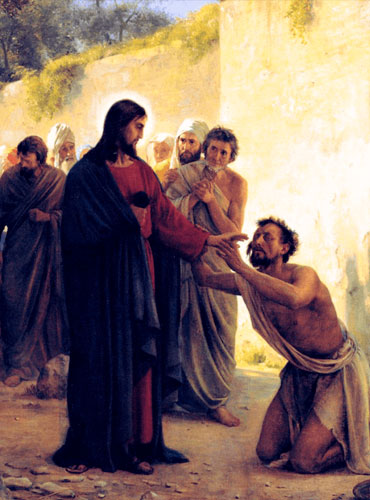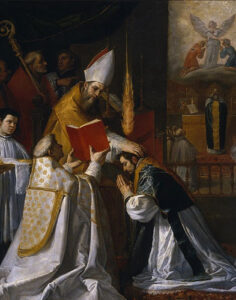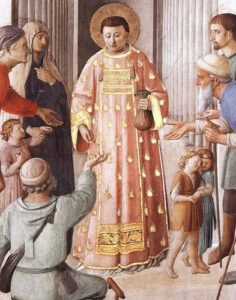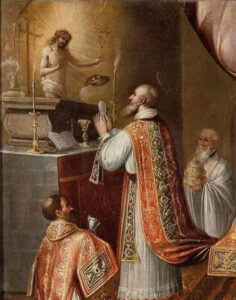Thursday of the Eighth Week of Ordinary Time – Mk 10:46-52
Today’s Gospel presents us with a blind man named Bartimaeus who shouts as he finds himself in the midst of a crowd as Christ was leaving Jericho. It was common for rabbis of the time to teach as they went walking, and we can assume that Jesus was teaching as He went, which would explain why the crowds were anxious to quiet the blind man.[1] Yet, in the actions of blind Bartimaeus, there are three details that call our attention, details which can help us a great deal in our lives.
First, notice that, although Bartimaeus might be physically blind, when it comes to who Jesus is, he sees far better than the crowds do. When he asks who is passing through, as a group the crowd tells him that it’s “Jesus of Nazareth.” But, when Bartimaeus cries out, he shouts for “Jesus, Son of David.” The crowd simply identifies Christ as a man from a certain town, and an insignificant town at that, but the blind man uses a title that immediately identifies Christ as the Messiah. We all know the saying that “seeing is believing,” when, really, the truth is quite the opposite. In the Letter to the Hebrews we read that “faith is the . . . evidence of things not seen” (11:1), and perhaps it was Bartimaeus’s blindness, the fact that there was no “evidence to be seen” for him, that allowed him to really have faith in Christ.
Second, rather than be discouraged by the crowds, who tell him to be quiet, Bartimaeus intensifies his cries and becomes even more intent on reaching Christ. When he first hears that it is Christ passing by, “he calls out,” and yet, once he’s told to be quiet, he gets even more intense and calls out “all the more.” Indeed, when Jesus calls Bartimaeus, the blind man “threw aside his cloak, sprang up, and came to Jesus.” That cloak was probably the only covering he had, and, had he lost it, he would have spent many cold nights. Likewise, Bartimaeus “springs up” and rushes to Jesus. Consider how bold those actions are for a blind man: if he loses the cloak among the crowd, he has no idea where it is. However, that doesn’t matter; he is more than willing to leave it behind as he springs up, and rushes towards Jesus, even though he can’t see where he is headed.
Thirdly, although Christ obviously knew what the man’s problem was, still, when the beggar was brought near Him, Jesus asked: “What do you want me to do for you?” Again, Jesus already knew, but the question not only provides the beggar with an opportunity to acknowledge his illness, but also to make an act of faith in Christ. The result is not only physical healing, but also spiritual healing as well. It calls our attention that this healing outside of Jericho comes shortly after the rich young man goes away sad. The rich young man had plenty of wealth and his sight, but become eternally poor because he couldn’t see things in the right perspective. On the contrary, the beggar was both poor and blind, but he not only gained his sight, but was also rich in faith.
There is plenty we can take away from this Gospel incident, but three come to mind rather quickly. First, we need to be humble, and ask God for His help. To live as a married person, or to live chastity or, even to simply live out our faith, requires grace and supernatural help, but we’ll only ask for it if we are really aware that we need it, which means we need humility. On the contrary, if we give into pride, then we will hear the awful words spoken to the church in Laodicea in the Book of Revelation: “You say, ‘I am rich and affluent and have no need of anything,’ and yet do not realize that you are wretched, pitiable, poor, blind, and naked. I advise you to buy from me . . . ointment to smear on your eyes so that you may see.” That ointment is the healing balm of humility, which helps us to keep things in perspective, to see things aright.
Likewise, in Bartimaeus’s shouting, we learn the value of perseverance. In a real way, we’re faced with the same struggle and the same options as he was: the world will try to quiet us, but we know that Christ will provide His help so that we can continue to proclaim the good news. The world doesn’t mind if we present Christ as a model for ethical living, or Christ as the tolerant, merciful man, but just try to present the world with Christ, the Son of God and the Crucified Savior who came to set the world ablaze and to free us from our sins. A society that claims to be very tolerant suddenly becomes quite intolerant of such things like objective truth, or the idea that certain things are always evil. To remain firm in the midst of difficulties is to have our sights firmly fixed on Christ and on the reward that He wants to give us in heaven.
Lastly, we’re reminded that sometimes our spiritual poverty and blindness is worse than Bartimaeus’s physical poverty and blindness. Often, we have difficulty seeing how God is working in our lives, particularly in those moments and events that seem to contradict His will or what He desires. With much more reason, then, do we need to ask God, “Lord, that I may see.” In his Gospel, John recounts another healing of a blind man. As the group of apostles with Christ passed him by, “His disciples asked Him, ‘Rabbi, who sinned, this man or his parents, that he was born blind?’ Jesus answered, ‘Neither he nor his parents sinned; it is so that the works of God might be made visible through him.’” In other words, the man is blind, so that God’s greatness can be seen. God’s works were made visible in that blind man, precisely through the blindness he suffered. Bartimaeus had a choice: knowing that Christ was passing by, he could have complained, or sworn, or done any number of things to argue that he didn’t deserve to be just a blind man begging by the side of the road. But he didn’t. Rather, his blindness became precisely the way Christ worked through him. In our lives, with the things that we must suffer and endure, Christ wants to make His power known. He wants to work His great deeds through us, but that is only possible if we cooperate with Him. The choice is ours.
Let us ask, through the intercession of Mary, Mother of Humility, for the grace to trust in God’s love for us and to ask for the graces we need, especially that of perseverance and to use our sufferings to draw nearer to Christ.
[1] Cf. Barclay’s commentary.







